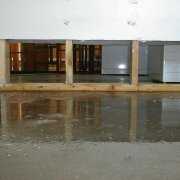Buyer Duped as Sellers Fail to Disclose Mold Problems
South Milwaukee, WI – The empty 37-unit Lake Ridge Apartment building overlooking Lake Michigan is a ghostly reminder of a hazardous mold problem that has caused a legal nightmare for the well-intentioned landlord/investor.
Rick Michalski was attracted to the three-story, pseudo Tudor building apartment complex at 3303-05 Marina Road, South Milwaukee based upon the information that was advertised in a sales brochure. He bought the prime real estate location thinking it would be a good investment for his retirement. It turns out the apartment complex was loaded with toxic mold, the result of poor construction practices. He had no alternative but to file suit against the former owners for failure to disclose; a common problem that is plaguing innocent real estate buyers nationwide at epidemic levels.
Just before Christmas 2004, Rick Michalski, who bought the building for $2.1 million in October 2003, told all the tenants to evacuate because toxic mold saturated the structure. Although the last tenants didn’t leave until March, Michalski, in good faith, said he hasn’t collected any rent since November, had to return security deposits and pay property taxes on the building.
“I’m on the verge of bankruptcy, but I’m keeping afloat,” Michalski said. The building can’t be safely occupied until the mold is removed and the conditions that permitted it to grow are corrected, a cost estimated at nearly $4 million, Michalski said.
In desperation, Michalski filed a lawsuit against the former owners of the building and the real estate firm that sold him the property. He states that the former owners, Henry Zeni and Eugene Bennett, were aware of the mold and did superficial repairs to conceal it. Zeni, a former advertising executive, was sentenced to 13 months in prison and fined $350,000 after pleading guilty in 1998 to federal price fixing charges in the brewery promotion businesses.
He also is suing West Bend Mutual Insurance for denying his coverage claims regarding the property that he had paid premiums on. As these claims are so commonly denied, a motion to dismiss Bennett from the suit scheduled to be heard by Milwaukee County Circuit Judge Christopher Foley on Monday. Zeni’s wife, DeAnn, was the Shorewest Realtors agent who listed the property for sale, and Henry Zeni, also a Shorewest employee, was the agent who showed Michalski the property. No word has been said if summary judgment was granted.
Catherine LaFleur, a lawyer representing the Zenis and Bennett, claims her clients allegedly had no knowledge of any problems with the building at the time of the sale. She said the problems are the result of Michalski’s failure to maintain the building properly.
Their claims, however, contradict the evidence. Michalski’s lawyer, Scott Halloin, cites an inspection report done by the Wisconsin Department of Health and Family Services that discovered evidence of a long-term water damage problem to the building. The state finding mirrored results of a private inspector hired by Michalski. Halloin also said he has found former tenants who had previously evacuated the building because the mold was causing their infant’s mold-induced illness.
Michalski, a non-practicing lawyer, was an experienced landlord. He owned six buildings in Milwaukee’s Merrill Park neighborhood when he learned about the South Milwaukee building in late July 2003.
On Nov. 1, 2003, just three days after the closing, Michalski began collecting rent from the tenants and found that some units were mysteriously vacant which were supposed to have been rented and other tenants were months behind in payments. A tenant complained about mold on a kitchen cabinet. Then Michalski later found out that during a storm, water had gushed through a light switch and into a light fixture in another apartment. It was then that he began to worry about widespread mold problems.
Michalski hired an independent private environmental firm, GZA GeoEnvironmental Inc., to inspect the building. In November 2004, his worst fears were confirmed. “All but three occupied units have mold levels that may pose a health risk to tenants,” GZA concluded.
Only three units had levels of mold that considered were safe; the others needed to be evacuated immediately. Michalski delivered the bad news to his tenants. He said he did not charge anyone rent for December and returned their security deposits. Michalski contacted the South Milwaukee Health Department, asking that it also inspect the building. The department deferred to the state’s Bureau of Environmental Health, an agency that has far more expertise in investigating mold problems.
Mark Chamberlain, an environmental health specialist with the bureau, inspected the building and reported in January that he found evidence of “long-term water intrusion and damage.” He said some of the problems were caused by leaky plumbing, while others were caused by poor construction practices.
“The damage is so widespread that I recommend an architect or structural engineer evaluate the ability of the rafters to support the roof,” Chamberlain reported. One of the most damaging documents found by Michalski’s lawyer was a fire inspection report from January 1994 that revealed eight code violations. Among the violations noted were the large amount of condensation and moisture that resulted in mold and mildew along floors and walls, around exterior windows and doors and in the carpeting. The report also noted that attic insulation blocked the vents and that bathroom fans vented to the attic rather than the exterior of the building.
Michalski relied on the seller?s disclosure statements and real estate listing as legal and factual. LaFleur, the lawyer for Zeni and Bennett, said Michalski should have had the building inspected before closing on the property. Michalski counters that several inspection times were postponed and canceled by Zeni and Bennett until just days before the closing on Oct. 29, 2003. He saw only a couple of the units, Michalski said, and paint and other camouflaged, stop-gap repairs covered exterior damage. The City of South Milwaukee does not require that properties be inspected for code compliance prior to sales, according to City Assessor Dan Walker.
South Milwaukee Building Inspector Jac Zader acknowledged that he met recently with Michalski but said he did not intend to issue a condemnation order for the building because he believes the damage could be repaired for less than the estimates. The law, he said, allows for the demolition if repairs exceed half the value of a property.
Unfortunately, the government has neglected to establish any guidelines for indoor air quality standards with toxigenic mold, making it very difficult to protect the public from this national health crisis. This stems from refuting liability from public buildings, low-income housing, and health concerns. The only instances where the government appears to be concerned are limited to high-level public official?s dwellings such as congressional residences, further angering innocent tax paying citizens nationwide.



 Image by Jonny Lindner from Pixabay
Image by Jonny Lindner from Pixabay 




